By Paul Rozycki
In an unusual move, the Michigan Democratic and Republican parties held their state conventions on the same weekend, in venues within a few miles of each other. On Aug. 25 the Republican Party held its state convention in downtown Lansing at the Lansing Center, and the Democrats met in East Lansing at the Breslin Center on Aug. 25 and 26. Typically the parties meet in different parts of the state, often on different weekends.
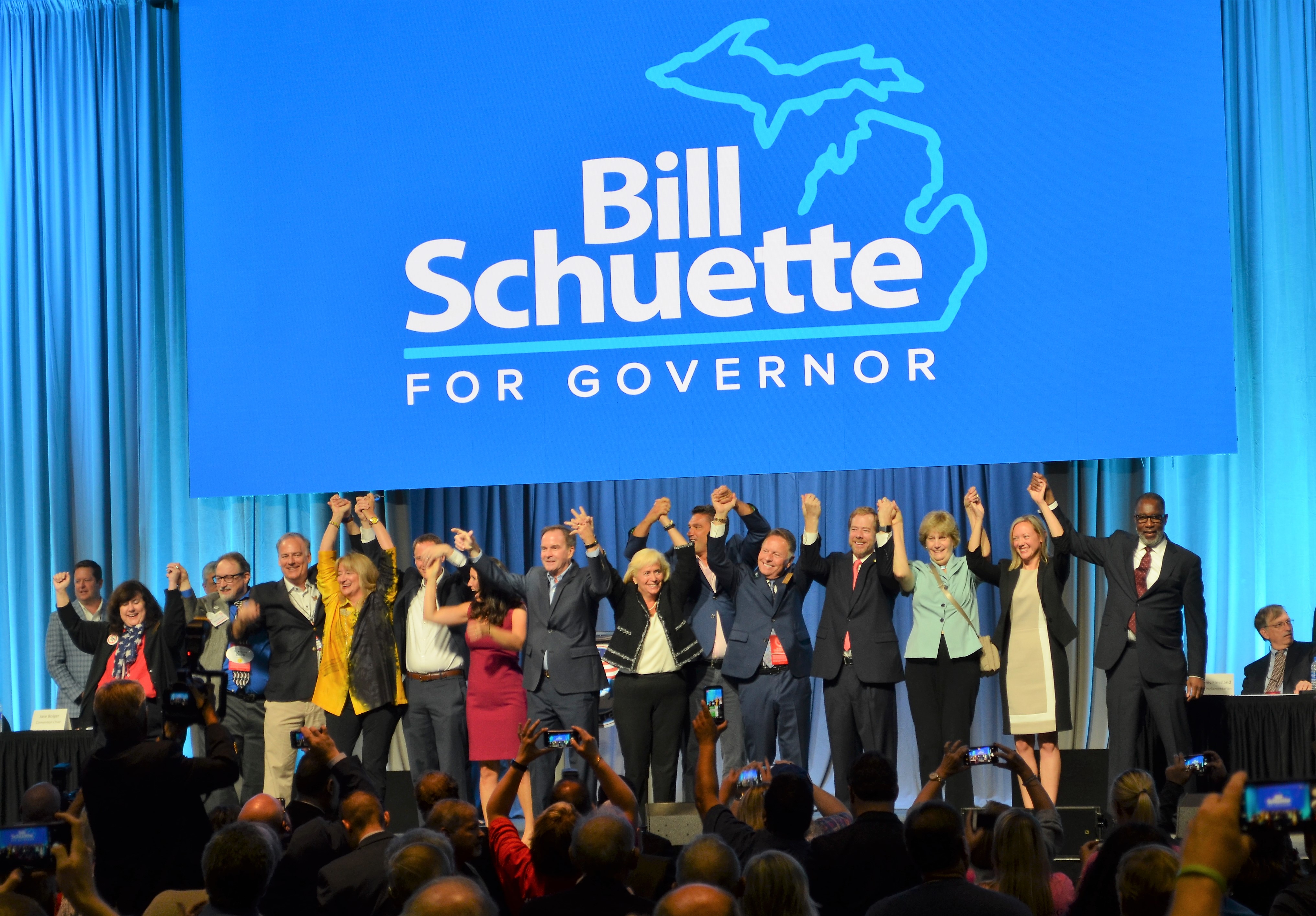
Republicans convened in downtown Lansing (Photo by Paul Rozycki)
More than two thousand Republicans and two thousand Democrats met in their respective conventions to choose nominees for Lt. Gov., secretary of state, attorney general, the Michigan Supreme Court, the state Board of Education, the Board of Regents for the University of Michigan, the Board of Governors for Wayne State University, and the Board of Trustees for Michigan State University.
Selecting the Lieutenant Governor
Both parties gubernatorial candidates had chosen their running mates before the conventions, and both conventions made the selections official. The reasons behind both choices were similar—to unite the party and heal divisions from the primary.
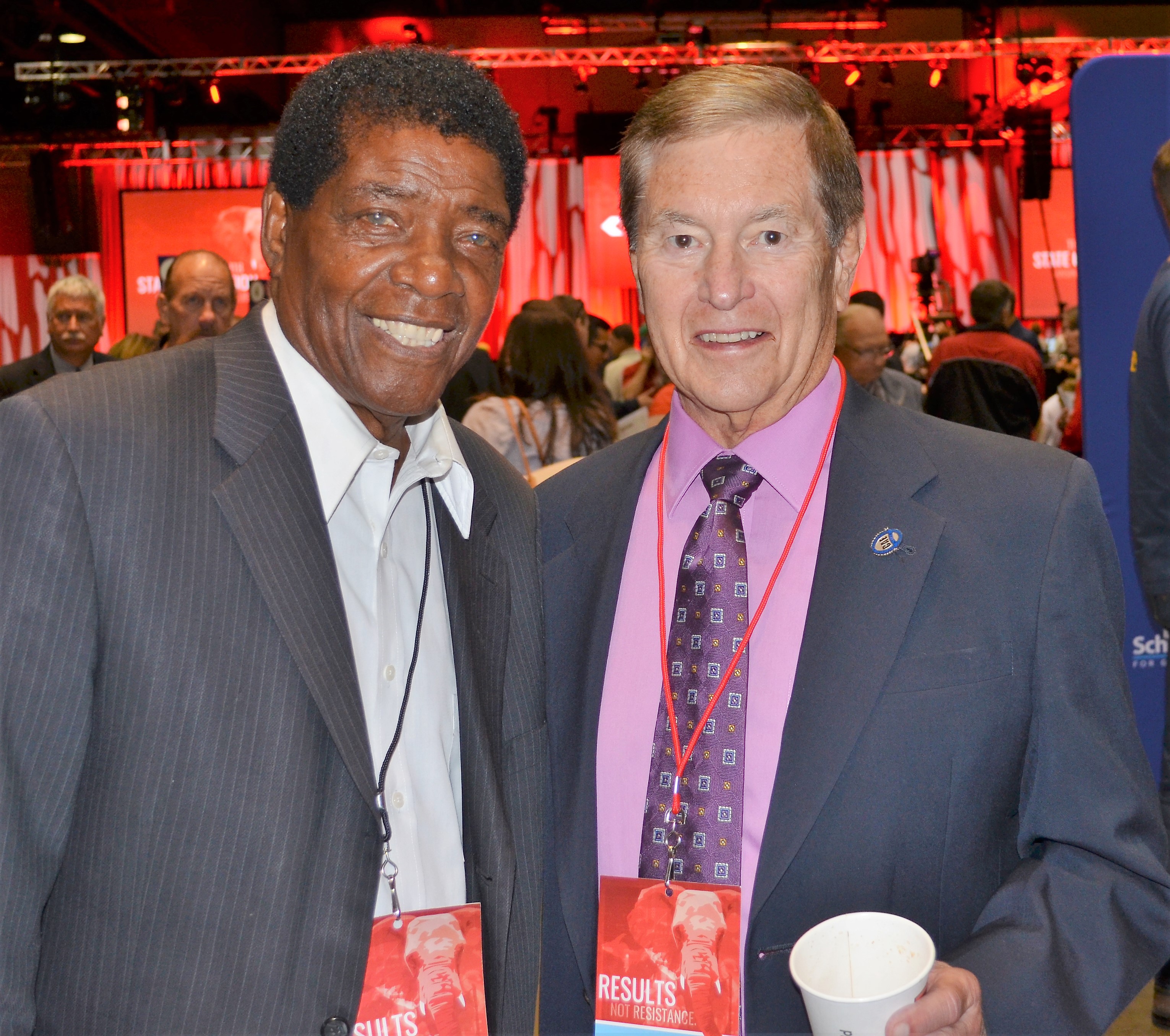
GOP delegates Henry Hatter of Clio and Justin King (Photo by Paul Rozycki)
Republican nominee Bill Schuette chose former state representative Lisa Posthumous Lyons as his running mate. Lyons is the daughter of Dick Posthumous, who served as Lt. Gov. under John Engler. Unlike Schuette, Lyons was not a supporter of Donald Trump during the 2016 campaign, though she now says she supports his policies. By nominating her, Schuette hopes to reach out to those party members who are not strong Trump supporters, and reach out to women voters. One sign of the division within the party is the fact that while Gov. Rick Snyder and Brian Calley endorsed the Republican ticket in general, neither one endorsed Schuette by name. Calley ran against Schuette in a hard fought primary and was supported by Gov. Snyder. Snyder chose to address the convention via a recorded video message rather than in person. Schuette said that he wasn’t worried about party divisions and that “We’re going to have a united party.”
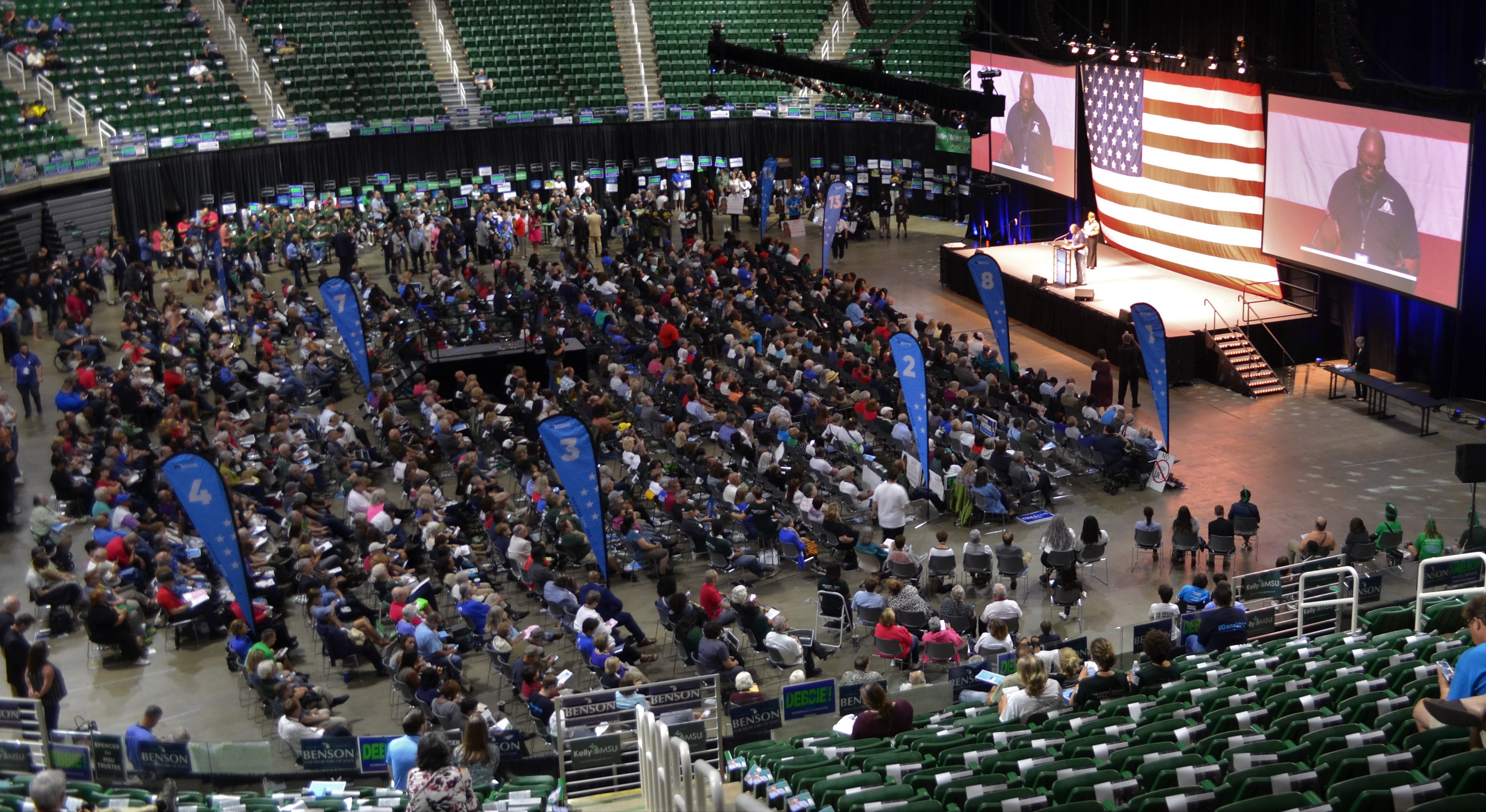
State Democrats convened at the Breslin Center (Photo by Paul Rozycki)
For the Democrats, Gretchen Whitmer has selected Garlin Gilchrist II as her running mate. The choice of Gilchrist, a progressive, tech savvy entrepreneur, is an attempt to motivate Black voters in Detroit where Whitmer needs a strong turnout. The hope is that Gilchrist will appeal to progressive Democrats who voted for Abdul El-Sayed or Shri Thanedar in the primary. Though he hasn’t held political office Gilchrist was part of the Obama campaign. In her concluding speech at the convention, Whitmer said “Abdul El-Sayed, Shri Thanedar and Bill Cobbs made me a better candidate, and made us a better party,” to motivate those who didn’t vote for her in the primary.
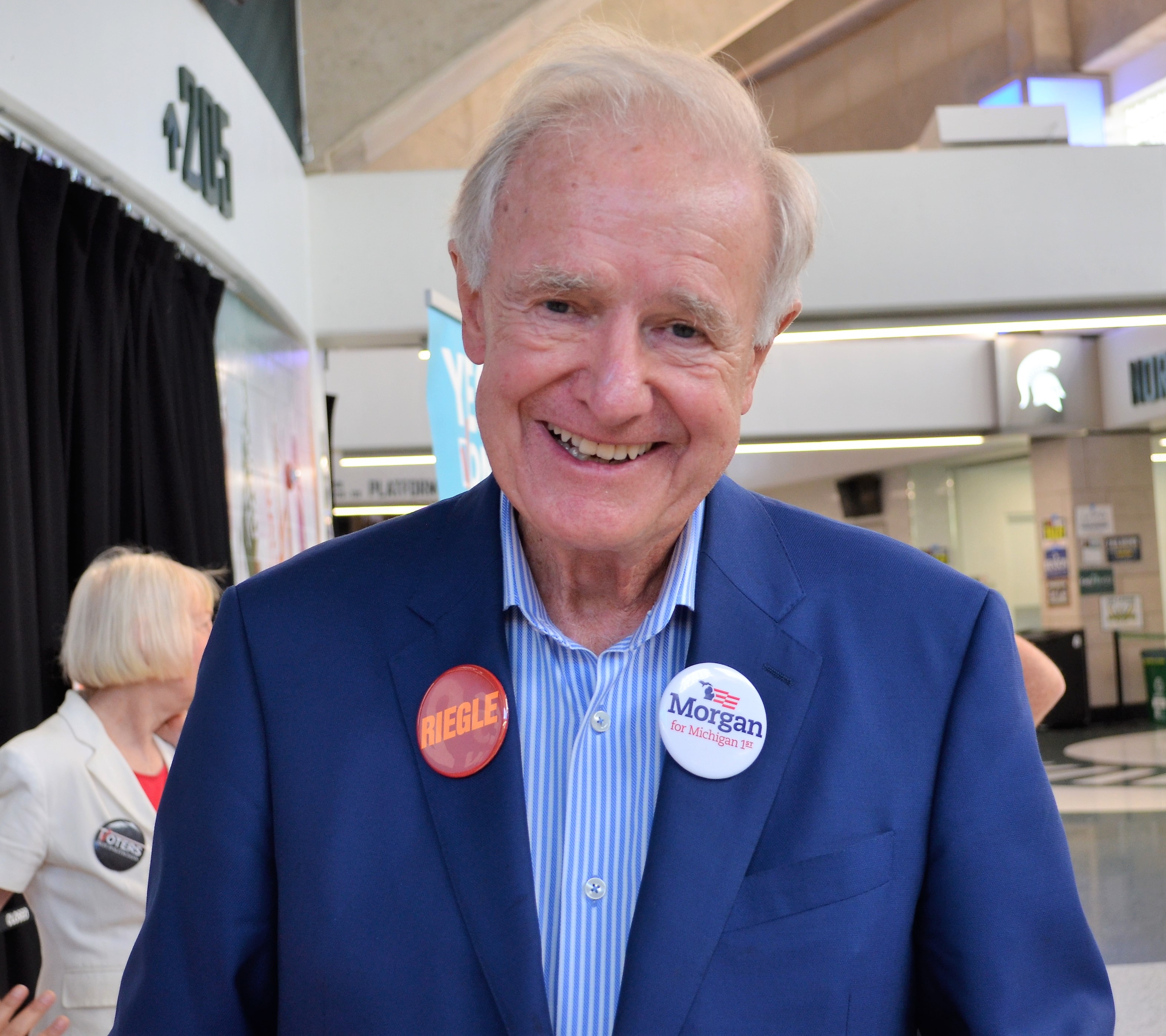
Convention-goer and legendary Flint Democrat, five-term U.S. Representative and three-term U.S. Senator Don Riegle (Photo by Paul Rozycki)
Secretary of State
The Republicans nominated Mary Treder Lang for secretary of state. She will face Democratic nominee Jocelyn Benson, former dean of the Wayne State Law School and 2010 candidate for secretary of state, in November. Lang defeated Joseph Guzman who was co-chair of Donald Trump’s 2016 campaign and was endorsed by the Michigan Trump Republicans. For the Democrats, the nominees for secretary of state, attorney general, and the Michigan Supreme Court received the party endorsement at an April convention in Detroit.
Attorney General
In a competitive contest for the Republican attorney general nomination, Republican House Speaker Tom Leonard defeated Tonya Schuitmaker to be the party’s choice to run against Democrat Dana Nessel. Schuitmaker, a private practice attorney, who served three terms in the state House, and two in the state Senate ran a strong, well-funded, campaign against Leonard, who has been an assistant prosecutor in Genesee County, and assistant attorney general before running for the state House of Representatives in 2012.
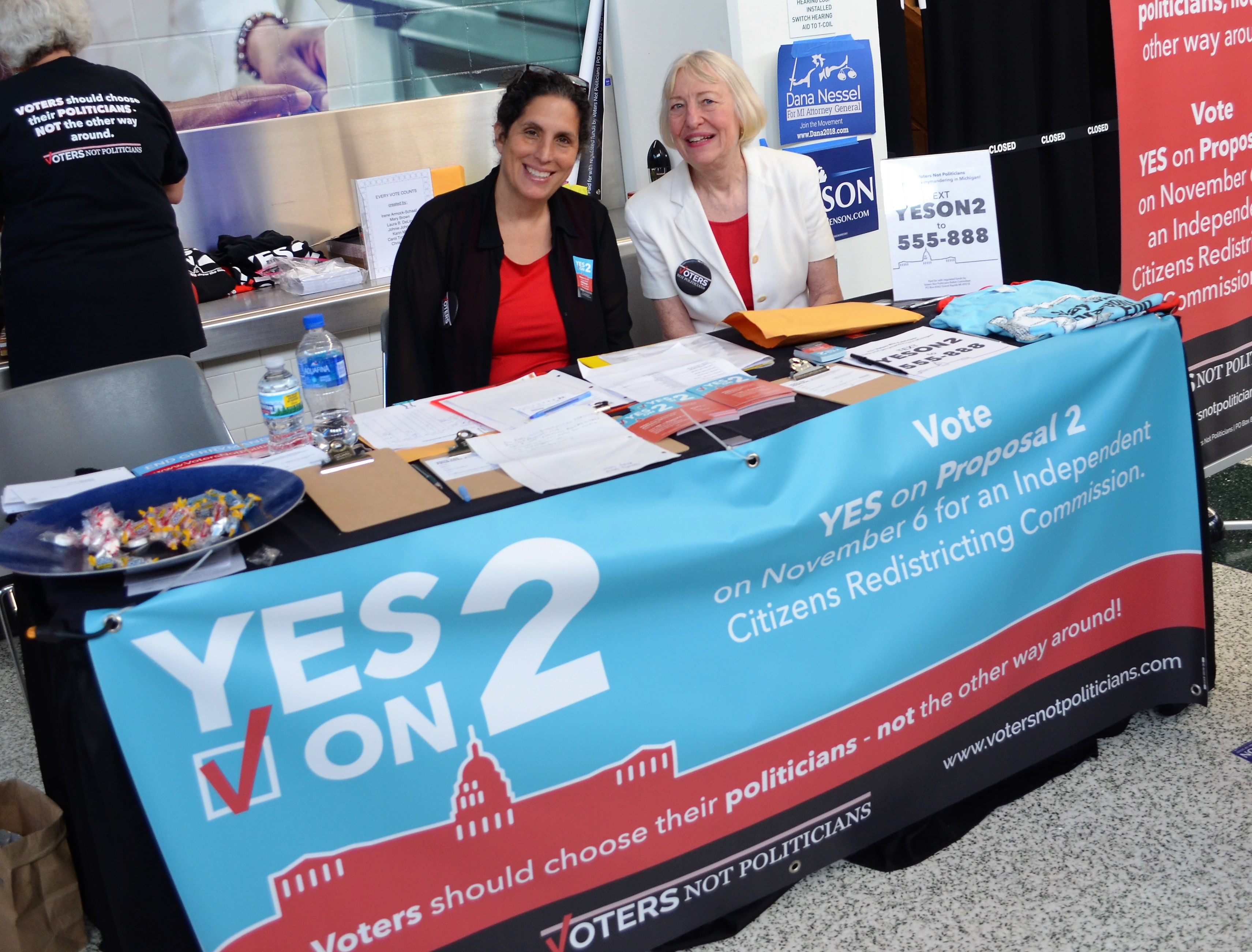
Representatives of many causes and candidates made their case at the Democratic convention, here including VotersNotPoliticians advocating for the anti-gerrymandering “YesOn2” (Photo by Paul Rozycki)
Michigan Supreme Court
Though the Michigan Supreme Court is nominally non-partisan, both political parties nominate candidates for the court at their state conventions.
The Republicans nominated Supreme Court Justice Elizabeth Clement and Justice Kurtis Wilder, but not without controversy. Because Justice Clement had voted to allow the constitutional amendment to end partisan gerrymandering to appear on the fall ballot, many Republicans objected to her nomination. Republicans felt the proposal would favor Democrats and opposed it. Though her nomination faced a chorus of boos at the convention, both she and Wilder will face Megan Cavanagh and Sam Bagenstos who were nominated by the Democrats on Sunday.
State Board of Education
On Saturday the Republicans nominated Tami Carlone and Richard Zeile for the State Board of Education. Carlone has led the attempt to repeal the Common Core requirements for schools and Zeile is a current state Board member and a pastor and principal of St. John’s Church and School in Taylor.
The Democrats chose Tiffany Tilley and Judy Pritchett as their nominees. Tilley is a realtor and substitute teachers in Southfield and Pritchett has been a superintendent of Centerline schools. Both will compete for the two seats on the State Board of Education.
Wayne State University Board of Governors
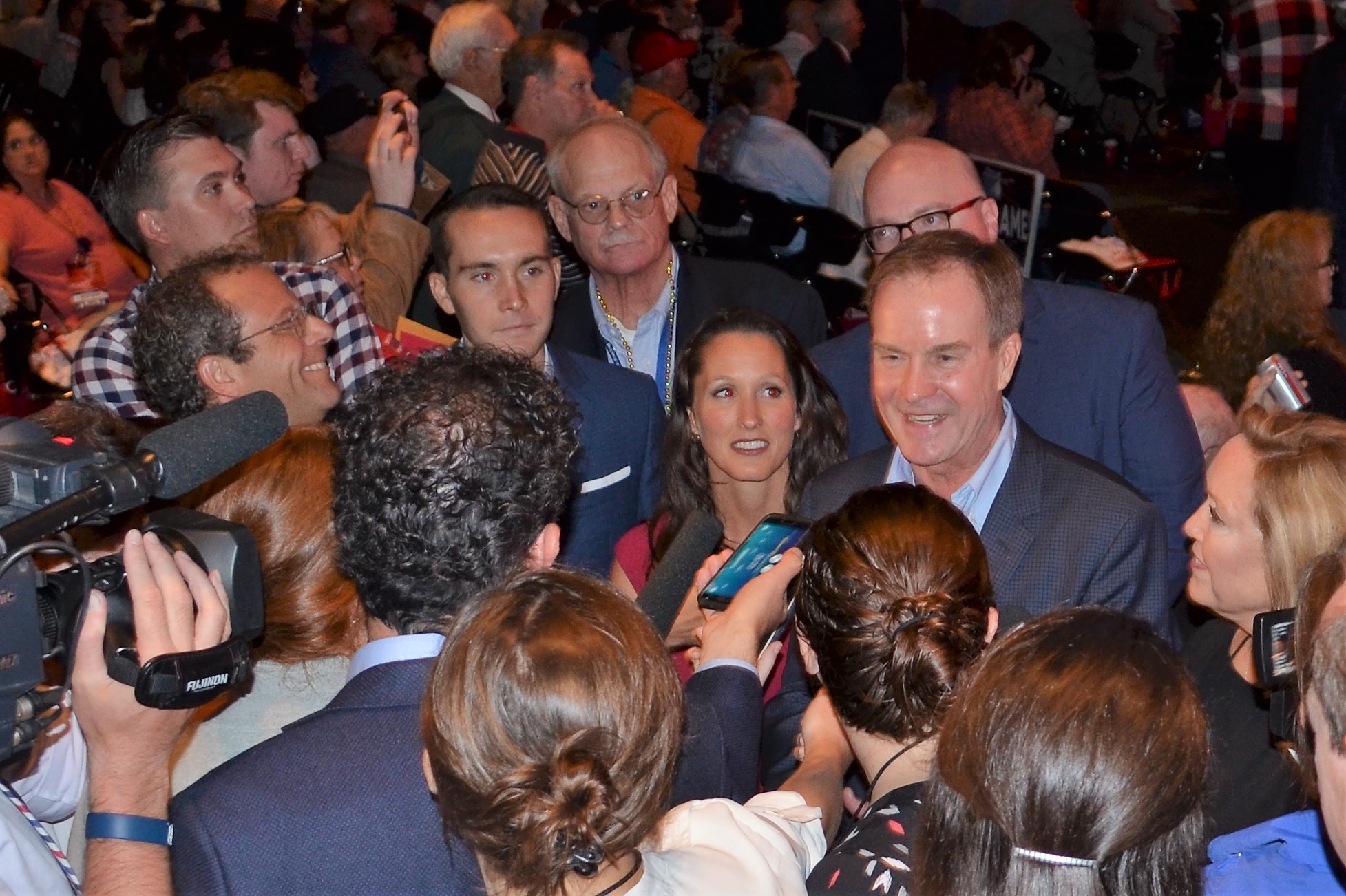
GOP gubernatorial candidate Bill Schuette swarmed by supporters (Photo by Paul Rozycki)
Each party had two slots to fill for the Wayne State Board of Governors. The Republicans nominated Diane Dunaskiss, who is currently on the Board and David Nicholson a Grosse Pointe business executive. They were unopposed for the nominations.
The Democrats nominated Anil Kumar, a surgeon who ran unsuccessfully for the U.S. House of Representatives in 2016, and Bryan Barnhill, who has served as Chief of Staff for the Detroit City Council president and is employed by the Detroit Mayor’s office.
University of Michigan Board of Regents
For the two slots on the University of Michigan Board of Regents, the Republicans nominated Ann Arbor airline executive Andrea Fischer Newman, and former state Rep. Andrew Richner. Both are incumbents and were unopposed for the nomination.
Paul Brown, a venture capitalist from Ann Arbor, and Jordan Acker an attorney who worked for U.S. Rep. John Conyers and were the choices for the Democrats for the U of M seats.
The Michigan State University Board of Trustees
While the university boards are often an afterthought in a political season, that certainly wasn’t the case for the race to fill two open slots on the Michigan State Board of Trustees. Because of the Larry Nassar scandal, a larger than usual number of candidates competed to fill the two slots on the Board.
At one point there were nine Democratic candidates including, Teri Bernero, the wife of Lansing’s previous Mayor and gubernatorial nominee, Virg Bernero. The Democrats chose Kelly Tebay and Brianna Scott. Scott is a Muskegon attorney, and Tebay is a rape survivor from her days at MSU. Both are MSU alums. All the Democratic candidates agreed on the need to replace John Engler as the temporary president of MSU, and deal more effectively with the Nassar scandal and its aftermath. Tables for each of the candidates surrounded the convention hall before the voting, and several conduced significant mail campaigns to delegates.
The Republicans nominated David Dutch, Traverse City and Mike Miller of Okemos. Miller’s daughter had been a gymnast who was treated by Nassar. They were unopposed for the nomination.
The open seats were created when two incumbent Republican members of the Board, Mitch Lyons and Brian Breslin, said they wouldn’t run for reelection in the midst of the Nassar scandal.
After the convention both parties hit the campaign trail with several events scheduled in the next few weeks, hoping to boost the turnout on Nov. 6.
EVM political writer Paul Rozycki can be reached at paul.rozycki@mcc.edu.



You must be logged in to post a comment.